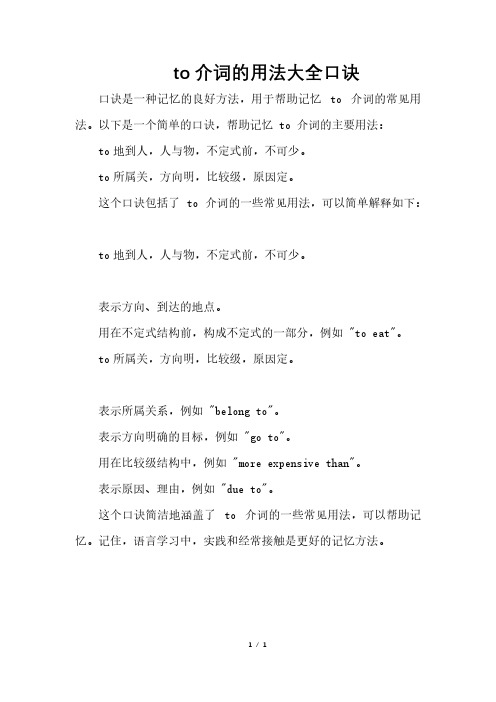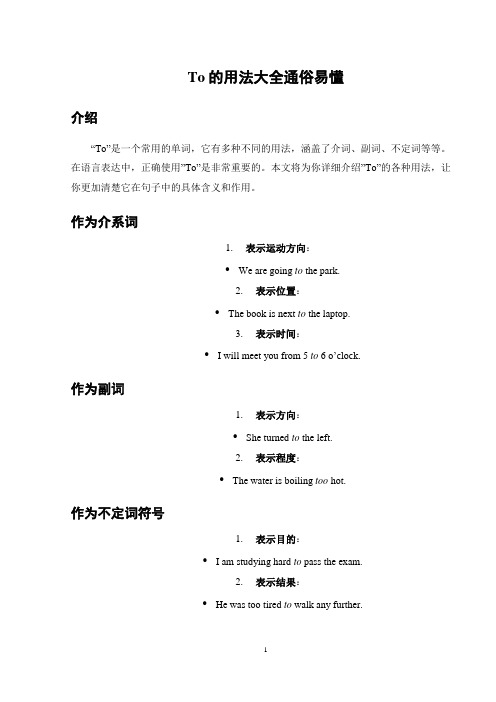To的用法大全
to介词的用法大全口诀

to介词的用法大全口诀
口诀是一种记忆的良好方法,用于帮助记忆to 介词的常见用法。
以下是一个简单的口诀,帮助记忆 to 介词的主要用法:to地到人,人与物,不定式前,不可少。
to所属关,方向明,比较级,原因定。
这个口诀包括了 to 介词的一些常见用法,可以简单解释如下:to地到人,人与物,不定式前,不可少。
表示方向、到达的地点。
用在不定式结构前,构成不定式的一部分,例如 "to eat"。
to所属关,方向明,比较级,原因定。
表示所属关系,例如 "belong to"。
表示方向明确的目标,例如 "go to"。
用在比较级结构中,例如 "more expensive than"。
表示原因、理由,例如 "due to"。
这个口诀简洁地涵盖了to 介词的一些常见用法,可以帮助记忆。
记住,语言学习中,实践和经常接触是更好的记忆方法。
1/ 1。
英语介词用法大全

英语介词用法大全★早、午、晚要用in,at黎明、午夜、点与分。
年、月、年月、季节、周,阳光、灯、影、衣、冒in。
将来时态in...以后,小处at大处in。
有形with无形by,语言、单位、材料in。
特征、方面与方式,心情成语惯用in。
介词at和to表方向,攻击、位置、恶、善分。
★日子、日期、年月日,星期加上早、午、晚,收音、农场、值日on,关于、基础、靠、著论。
着、罢、出售、偷、公、假,故意、支付、相反,准。
特定时日和“一……就”,on后常接动名词。
年、月、日加早、午、晚,of之前on代in。
步行、驴、马、玩笑on,cab,carriage则用in。
★at山脚、门口、在当前,速、温、日落、价、核心。
工具、和、同随with,具有、独立、就、原因。
就……来说宾译主,对、有、方状、表细分。
海、陆、空、车、偶、被by,单数、人类know to man。
★this、that、tomorrow,yesterday,next、last、one。
接年、月、季、星期、周,介词省略已习惯。
over、under正上下,above、below则不然,若与数量词连用,混合使用亦无关。
…beyond超出、无、不能,against靠着,对与反。
besides,except分内外,among之内along沿。
同类比较except,加for异类记心间。
★原状because of,、owing to、due to表语形容词under后接修、建中,of、from物、化分。
★before、after表一点, ago、later表一段。
before能接完成时,ago过去极有限。
since以来during间,since时态多变换。
与之相比beside,除了last but one。
复不定for、找、价、原,对、给、段、去、为、作、赞。
快到、对、向towards,工、学、军、城、北、上、南。
but for否定用虚拟,复合介词待后言。
ing型由于鉴,除了除外与包合。
英语介词用法口诀大全

英语介词用法口诀大全
1. In, on, at 常与时间连,时间地点兼备用。
2. From, to, until, till 时间区间好表示,时间段也可大显神通。
3. By, with, from, of 用于表现方式,类别性介词很不错。
4. Of, for, to 用于表目的,句子结构会媲美。
5. About, with, by 用于表同伴,主谓间隔并不遥远。
6. To, with, without 用于表伴随,进行中卖力才是王道。
7. In, to, on, at 用于表示空间,位置与方向齐心助阵。
8. From, between, among 分别表起点、间隔和混杂,还可表格局不一并掌握。
9. Of, in, about 用于表品质,为句子增色不在话下。
10. About, on, with 用于表主题,内容丰富不含糊。
11. In, on, at 用于表时刻,具体程度可考虑。
12. By, of, with 用于表方式,越具体越考验。
Used to的用法

Use用法大全(一) u sed to do 过去常常做某事. "过去常常"表示过去习惯性的动作或状态,但如今已不存在。
例句: I used to play football after school.过去我常常在放学后踢球.Mother used not to be so forgetful.Scarf used to take a walk. (过去常常散步)used to do曾经/过去常常做某事,如:He used to live in the country.他曾经住在农村。
used to表示过去常常做某事.例句: I used to play football after school. 过去我常常在放学后踢球.used to do "过去常常"表示过去习惯性的动作或状态,但如今已不存在。
Mother used not to be so forgetful.Scarf used to take a walk. (过去常常散步)used to do 过去常常做某事He used to do a lot of drinking but has signed off now.他过去常常喝酒,但现在戒掉了。
used to表示过去常常做某事.例句: I used to play football after school.过去我常常在放学后踢球.used to do曾经/过去常常做某事,如:He used to live in the country.他曾经住在农村。
used to do 表示过去常常做某事,映射现在不这样了I used to get up late in the morning, but now I often get up early.(二) b e used to sth/doing:对……已感到习惯,或"习惯于",to是介词,后需加名词或动名词。
to作为介词的用法

to作为介词的用法
介词to是英语中常见的一个词汇,它在句子中有多种不同的用法,下面是to作为介词的用法大全:
1. 表示方向和目的
to通常用来表达方向和目的,如:go to school(去学校),come to me(来找我),send a letter to him(给他写信)等。
2. 表示时间
to也可以用来表示时间,如:from Monday to Friday(从周一到周五),from nine to ten(从九点到十点)等。
3. 表示接近度
to可以表示两个事物的接近程度,如:close to the door(紧靠门),next to the park(在公园旁边)等。
4. 表示数量
to可以表示数量,如:one to ten(从一到十),two to one(从二到一)等。
5. 表示比较
to也可以用来表示比较,如:superior to him(比他优秀),inferior to her(不如她)等。
6. 表示用途
to还可以表示用途,如:a key to the door(开门的钥匙),a solution to the problem(解决问题的方法)等。
7. 表示给予
to可以表示给予,如:give a present to him(给他礼物),offer help to her(向她提供帮助)等。
8. 表示形式
to还可以表示形式,如:convert from liquid to gas(从液体转化为气体),change from red to blue(从红色变为蓝色)等。
以上是to作为介词的用法大全,希望对你的学习有所帮助。
高中英语语法:非谓语复习之to do用法大全

非谓语动词及To do在英语中,不做句子谓语,而是担任其他语法功能的动词叫非谓语动词。
有3种,动词不定式、动名词和分词(含现在分词和过去分词),另外,动名词和现在分词统称为-ing形式。
它们在句中的作用,以及各自的时态和语态见下表:非谓语动词在句中的作用非谓语动词的时态和语态动词不定式动词不定式是动词的一种非谓语形式,在句中不能单独作谓语。
动词不定式具有动词的性质,它可以有自己的宾语和状语,从而构成动词不定式短语。
它还可以有形式的变化,即一般式、进行式、完成式和被动式。
同时,动词不定式也具有非动词的性质,相当于一个名词、形容词或副词,可以在句中担任主语、宾语、宾语补足语、表语、定语和状语。
一、动词不定式的特征和种类动词不定式是由不定式符号to+动词原形构成,在某些情况下to也可省略。
(一)不定式的一般式不定式的一般式表示的动作通常与主要谓语的动作同时或几乎同时发生,或是在它之后发生。
He appears to be very happy.他看起来好像很高兴。
(同时发生)To catch the train, we'd better hurry to the station by taxi.为了赶上火车,我们最好赶紧乘出租车去车站。
(to catch the train发生在hurry to the station之后)(二)不定式的进行式不定式的进行式表示正在进行的或与谓语动词同时发生的动作。
It happened to be raining when I got there.我到达那里的时候,天碰巧在下雨。
I'm glad to be traveling with you.我很高兴和你一起旅游。
(三)不定式的完成式不定式的完成式表示的动作在谓语表示的动作之前发生。
I'm sorry to have lost your key.我很抱歉把你的钥匙弄丢了。
I meant to have finished my work last night, but I didn't feel very well.我本来想昨晚完成工作的,但是我感觉身体不舒服。
to的用法大全通俗易懂

To的用法大全通俗易懂介绍“To”是一个常用的单词,它有多种不同的用法,涵盖了介词、副词、不定词等等。
在语言表达中,正确使用”To”是非常重要的。
本文将为你详细介绍”To”的各种用法,让你更加清楚它在句子中的具体含义和作用。
作为介系词1.表示运动方向:•We are going to the park.2.表示位置:•The book is next to the laptop.3.表示时间:•I will meet you from 5 to6 o’clock.作为副词1.表示方向:•She turned to the left.2.表示程度:•The water is boiling too hot.作为不定词符号1.表示目的:•I am studying hard to pass the exam.2.表示结果:•He was too tired to walk any further.作为连接词1.引导不定式:•She decided to go shopping.2.引导名词从句:•We need to know what happened.其他常见用法1.to be:作为be动词的一部分,用于构成进行时态和被动语态。
•He is going to the store.2.to have:作为have动词的一部分,用于构成完成时态。
•She has gone to the library.3.to go:表示动作的进行或未来。
•They are planning to go on a trip.总结“To”是一个多功能的词,在不同语境下有着不同的用法。
通过本文的介绍,希望你能更好地理解和运用”To”的各种用法,使你的表达更加准确和流畅。
继续学习和练习,你会越来越熟练地使用”To”这个词,提升自己的语言表达能力。
to的用法口诀大全

To的用法口诀大全To是一个常用的英语单词,具有多种用法,包括介词、不定式标志、动词不定式符号等。
正确掌握To的用法对于学习英语来说至关重要。
下面是To的用法口诀大全,帮助大家更好地理解和运用这个常见的小词。
1. 表目的、意图、方向To表示目的地义,接不定式,不可省。
例句:They are going to the park.翻译:他们要去公园。
2. 与动词不定式连用To加动词不定式,表示不肯定,一般来说不省略。
例句:She likes to sing.翻译:她喜欢唱歌。
3. 表示属于To表示属于关系,多用于人继有生活场合。
例句:This book belongs to me.翻译:这本书是我的。
4. 介词用法To表示指向,接地点名词前。
例句:Come to my house.翻译:来我家吧。
5. 表示按照To表示按照,符合现实或命令。
例句:She danced to the music.翻译:她随着音乐跳舞。
6. 表示接近、达到To表示接近或达到,接名词或动词后作定语。
例句:It’s time to go.翻译:是该走的时候了。
7. 表示对比To可表示不同、相对之意,常用于形容词前。
例句:He is friendly to everyone.翻译:他对每个人都友好。
8. 引导间接宾语To引导的宾语通常是人称代词或名词。
例句:I gave the book to him.翻译:我把书给了他。
9. 表示因果关系To表示因果关系,引导一个结果。
例句:She was too tired to walk.翻译:她太累了,无法走路。
10. 用于英文习语To还常用于一些习语中,如“to be continued”等。
例句:The story is to be continued.翻译:故事将继续。
以上是To的用法口诀大全,希望对大家在学习和运用英语时有所帮助。
请多加练习,加深理解,从而更熟练地运用这个常用的英语小词。
- 1、下载文档前请自行甄别文档内容的完整性,平台不提供额外的编辑、内容补充、找答案等附加服务。
- 2、"仅部分预览"的文档,不可在线预览部分如存在完整性等问题,可反馈申请退款(可完整预览的文档不适用该条件!)。
- 3、如文档侵犯您的权益,请联系客服反馈,我们会尽快为您处理(人工客服工作时间:9:00-18:30)。
一:表示相对,针对be strange (common, new, familiar, peculiar, distinct, sensitive, immune, vulnerable, indispensable)toAir is indispensable to life.Aircrafts are vulnerable to interference caused by radiation.This injection will make you immune to infection.二:表示对比,比较1:以-ior结尾的形容词,后接介词to表示比较,如:superior ,inferior,prior,senior,juniorThe quarrel happened prior to my arrival.2: 一些本身就含有比较或比拟意思的形容词,如equal,similar,equivalent,analogousA is similar toB in many ways.3:表示一些先后顺序的形容词,如:second,subsequent,next,preliminary,preparatorySubsequent to the war,they returned to their hometown.4: to也偶尔出现在个别动词之后,与动词形成固定词组,表示比较,如:prefer to,compare to,in contrast tocompare to sth.表示比喻或比拟,而compare with sth.表示比较,如:World is usually compared to a stageCompared with his past,he has changed a lot.Prefer的正确句型是:prefer A to B或prefer doing A to doing B,但当prefer后接动词不定式时,表示比较的介词to就要改成rather than ,如:The undaunted soldier preferred death to surrender.Many people prefer spending money to earning money.They prefer to pursue careers rather than remain home as house wives.5: to与及个别的名词构成比较之意,如:alternativeGoing to an under water concert is a great alternative to going to dinne三: 表示修饰关系1: 表示回复,反应意思的词,如:answer to question,solution to problem,response to inquiry,reaction to proposal,reply to letter2: 表示建筑构件的词汇,如: entry,entrance,approach,access,passage,exit,vent,paththe approach to a bridge引桥the approach to scienceHalf of the population was estimated to have no access to the health service.The access to education 接受教育的机会The access to medical care 享受公费医疗的权利3: 表示人物职位和官衔的词,如:assistant to manager, ambassador to Spain, successor to tradition, heir tothrone,deputy to the National People's Congressadvisor to the Prime Minister4: 表示权利和许可的词汇,如:right,admissionThe employee finally got the admission to the boardroom.Everyone has an equal right to …………5: 表示栅栏或障碍的词汇,如:bars to development,the barrier to progress6: 表示与书籍,文本相关的词,如:introduction to passage.7: 表示恭喜或是祝贺,如:The director proposed a toast to the health of the guests.Let's drink to Dick's success in business8: 另外还有一些名词符合这种用法,有的具有两者息息相关,缺一不可的含义.如:key to door,invitation to party, guide to action,limitation to life,accessory to school四: to还具有依据,伴随,和着节奏的含义,如:sing to piano, chance to the tune, stamp to the rhythm of the song, add salt to taste(一):表示相关联,相连接,如:be related to,be relative to,in relation to,be relevant t Investigate all the facts related to the problem.People often linked walth to happiness.(二):表示反对和赞同。
1:to引导的表示反对,抗拒,对抗意义的词组。
Be opposed to,be oppsist to,be contrary to,be adverse to,be resistant to,be contradictory to,object to,oppose to,deny tp,be aline toThese buildings are resistant to earthquake.They are to tally opposed to any changes being made in the plans.2: to引导的表示同意,赞同意义的词组:consent to,subseribe to,The employer consented to give him a salary raise.表示调整,使符合,使适应的含义,如:adapt to,commodate to, adjust to,conform to,habituate to,fit to,suit to,correspond to,cater toShe tried to habituate herself to the style of plain living.Your action should conform to the interests of the people.They offered various foods to cater to the need of customers.His words doesn't fit to his actions.Suit your writing style to the masses.3: 表示投降,屈服,服从的含义,如:be subject to,be subordinate to,submit to,subjectto,surrender to,give in to,confess to,admit toThe minority is subordinate to the majority少数服从多数Countries nearby oceans are always subject to earthquake.He confessed to having robbed the woman of her wallet.We're not the kind of people to yield to any military threat.五: 表示趋势或倾向,如:tend to,be prone to,be inclined to,be apt to,be liable toHe's liable to seasickness.You are liable to come to wrong conclusion.六: 表示对事情的坚持与执着,如:sick to,hold o,adhere to,cling toHe still holds on to his original views.七: 表示约束,局限,如:limit to,confine to,resrict toHe's confined to the house by illness.He confined his remarks to scientific mangement.八: 表示一种习惯或是一种适应性,如:get (be)to,used to,be accustomed toFinally,the students got used to my teaching method.九: 表示起因和原由,如:owing to,due to,thanks to,attribute to,come down toThe flight was cancelled due to the thick fog.The famous artist attributed his success to his wife十: 表示目的或结果,如:aim to,lead to,give rise toI aim to be an excellent college teacher.His conceit lead to his failure.These bad condition has given rise to a lot of crises十一: 表示命运,注定,如:be doomed to,be destined to,All military adventures by the two super powers are doomed to fail.十二: 表示数量上的积累或增加,如:in addition to,add to,amount toIn addition to relief supplies,he also presented with some money.The annual output of steel amounts to 1200 tons.十三: 表示全身心投入的含义,如:be addicted to,contribute to,devote to,commit toHe is determined to devote all his life to his.十四: 表示展望或是回顾,如:look forward to反date back toThe church dates back to the 13th century.十五: 表示方位概念.如:close to,next toI don't like wool next to my skin.十六: 表示依靠或借助,如:resort to,turn to,appeal to,He usually appeals to arms to settle the territory dispute.十七: 表示有关注,关于: as to,with regard to十八: 表示关注或重视,如:pay attention to,attach to,We should attach primary importance to job training.十九: 表示依据或是根据,如:according to,in proportion toAccording to today's newspaper,the match will be postponed.The lending countries subscribe towards capital stock in proportion to heir economic importance.二十: 表示应该或必须含义的句式, 如:It's time to get up.We are supposed to get here at seven.It's up to this country to ban nuclear weapons.常用词组respond to(反应), appeal to(吸引), catch on to(理解), listen to (收听),used to (过去常常), give birth to,attend to(照料), see to(负责), be entitled to(有权), belong to (属于), come to(苏醒), stand up to(勇敢面对), help oneself to(请自便), refer to,to the point(切题),Train them to stand up to any severe test in hard.The ticket entitled you to a free meal in the luxury hotel.See to it that the children get a hot meal after their swim.You will catch on to the job shortly after wards.People usually refer to television for up-to-the-minute news.。
